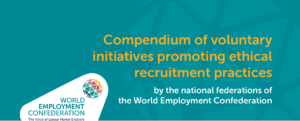60% of all global workers are working informally. As such, they are devoid of the most basic of fundamental principles and rights of work and exposed to serious threats, including forced and bonded labour. Fighting informality remains the greatest challenge for the global labour market.
Quality private employment services provide decent work to jobseekers and workers. In doing so they contribute to offering workers a way out of the vulnerability and precarity of informal and/or undeclared work.
However, this is only one piece of a complex puzzle. Basic rule of law provisions and principles and an appropriate regulatory framework that enables diverse and quality forms of work, including their effective and proportional enforcement , are crucial preconditions for any successful national strategy for moving from an informal economy to a formal one.
In 2015, the International Labour Organisation (ILO) agreed on Recommendation 204 “Transition from the Informal to the Formal Economy Recommendation”. In this recommendation the ILO advises on the different elements for transitioning out of informality.
Part of this recommendation is securing access to quality employment services in order to support people in finding a formal job.
The World Employment Confederation is dedicated to supporting the transition from informal to formal work. Quality employment services contribute to creating a path out of informal employment as they provide access to formal and quality jobs.
 A vast set of national and international measures are taken in the private employment services industry to secure quality and compliant services and work. These include the creation of a global Code of Conduct for the members of the World Employment Confederation as well as the certification and enforcement of the national employment agency sector in close collaboration with public authorities. The World Employment Confederation has also developed a compendium of voluntary initiatives promoting ethical recruitment practices put in place by some of its national federations.
A vast set of national and international measures are taken in the private employment services industry to secure quality and compliant services and work. These include the creation of a global Code of Conduct for the members of the World Employment Confederation as well as the certification and enforcement of the national employment agency sector in close collaboration with public authorities. The World Employment Confederation has also developed a compendium of voluntary initiatives promoting ethical recruitment practices put in place by some of its national federations.
On international, national, and corporate levels, the industry works with policy-makers and public employment services to promote the best delivery of employment services to jobseekers in the formal and informal economy. The World Employment Confederation for instance contributes to the ILO Fair Recruitment Initiative.